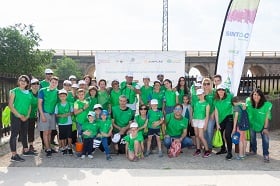RepescaPlas: results of the first characterisations of wastes collected in the ports of Valencia and Galicia

The project RepescaPlas ‘Material recovery of plastic wastes collected from the sea: characterisation, applications and product development’ is born to find a solution to the marine wastes and their negative effect on the marine environment, transforming the plastic fraction waste removed with help from fishermen, into new products that can enter the market.
The beginning in March of the collection of the wastes found during fishing carried out by the involved fishermen embarked on trawlers and vessels from the Fishermen association of Gandia and on trawlers unloading in the ports of Marín and Vigo, has allowed to extract 837kg of marine litter from the sea bed located in areas close to these ports, well above the initial objective of 300kg.

During April and May, other activities began, such as the characterization, counting and classification of marine wastes, by using the MARNOBA’s platform methodology, developed by Asociación Vertidos Cero with the support of Fundación Biodiversidad, thus making possible obtaining essential information on the marine litter accumulated on sea bed, which is over 50m in the Mediterranean Sea and over 100m in the Atlantic area, near the Galician coast. This information will be sent to the marine litter monitoring programme of the Ministry for Ecological Transition.
During these first months, it has been possible to count and classify about 4,070 objects, 3,870 of them removed by trawlers and 200 obtained by using fishing gears such as trammel net fishing, which enabled to collect floating marine litter.

The 78 % of the objects collected belong to the category of ‘plastics’ (3,171 objects), a 9 % to the category of ‘metals’ and a 7 % to ‘others’ (including clothes, fabrics, rubber boots, tires, shoes, etc.). The remaining 6 % are objects belonging to the following categories: ‘paper/cardboard’, ‘processed wood’, ‘glass’ and ‘hygienic-sanitary’ wastes. No objects were found in the category of ‘medical’ for the moment.
Regarding the top ten of objects found, six of them (plastic bags, industrial packages, plastic sheets, plastic bottles, plastic threads and ropes, metal beverage cans and glass bottles and pieces) were found in the area where the project is being developed, in other words, the Balearic-Levante and the North-Atlantic borders, two of the five Spanish coast borders.
The project RepescaPlas is being developed with the collaboration of Fundación Biodiversidad, the Ministry for Ecological Transition through the programme Pleamar, co-funded by the FEMP (Spanish Federation of Municipalities and Provinces). The project is coordinated by AIMPLAS and Fundación Global Nature, Asociación Vertidos Cero, the University of Vigo and the Fishermen association of Gandia participate too.
